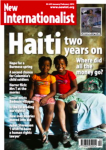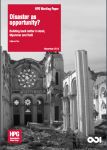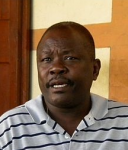Haiti Support Group Post-Earthquake Priorities
At 4.53pm on January 12th 2010, the earth shook violently in and around the overcrowded city of Port-au-Prince, Haiti’s capital. The death toll, destruction and destitution caused in in just seconds were well chronicled — for about ten days — by the international media.
There was no definitive death toll, but we do know that between 230,000 and 305,000 people died. Some 4,100 of those who survived had to have emergency amputations — often in horrendous conditions. At least 1.5 million people were made homeless.
Just as the media failed to analyse the social, economic and political conditions that played such a role in making the Haitian earthquake the most deadly natural disaster this century, the press are no longer there to tell you the the inspiring tale of how Haitians are responding. WE DID.
For over 30 years, we have been amplifying the voices of Haitian grassroots organisations through lobbying, campaigning and advocating. In doing so, the Haiti Support Group (HSG) plays a vital role in educating politicians, press and public in Europe and North America. Never has this role been so vital.
Despite what you may have read about the UN, the Red Cross, international NGOs or Bill Clinton (the UN Secretary General’s Special Envoy to Haiti), it is Haitians, not foreigners, who are playing the lead role in the reconstruction of Haiti.
As numerous donor bodies try (or often don’t) to co-ordinate a reconstruction and redevelopment program, it is Haitians working as rubble clearers, builders, flood prevention engineers, health promotors, sanitation workers and teachers who are forging their own vision of a new Haiti.
We believe that an evolving and expanding grassroots vision needs to replace the flawed development model that singularly failed the vast majority of Haitians in the three decades preceding the earthquake. That failed template — an urban, centralised, factory-assembly plant model — accounts for much of the massive death toll in the earthquake.
We have rededicated ourselves to amplifying the voices of ordinary Haitians demanding a real say in the development models now being forged by others for their country. We have launched campaigns (eg on forced evictions of the internally displaced (please see our Campaigns and Advocacy section) and are lobbying in Brussels for better use of EU aid, e.g. to build more food sovereignty.
All such efforts need YOU more than ever. We have some secured some external funding. But this is always temporary, whereas the need to speak up for equitable development policies, human rights, genuine participatory democracy and the ordinary Haitians who advocate them but are usually ignored, is a long-term effort.
In the meantime as Haitians say: Le ou bezwen, se ou k’ pou mache — When it’s you in need, it’s you who must take the first step. Haitians have indeed taken the first step post- earthquake but, as this website makes clear, they face massive obstacles. Accompany them, and us, on a journey that will be as challenging as the remotest Haitian mountain road. Please join the Haiti Support Group now.
'Natural' Disasters in Haiti and the 2010 Earthquake

Special Edition New Internationalist: Haiti Two Years On
Beyond Relief Beyond Belief is the lead article in the analysis/special feature section of the January/February edition of the New

Can disasters become an opportunity? Building back better in Aceh, Myanmar and Haiti
Can disasters become an opportunity? Building back better in Aceh, Myanmar and Haiti Information courtesy of the Overseas Development Institute

New Book, Old Paul Farmer: Discuss
New Book, Old Paul Farmer: Discuss Anyone who can draw six hundred people paying $30.00 a head to a Washington

Délégation APP/UE : Haïti doit rester une priorité
Délégation APP/UE : Haïti doit rester une priorité. P-au-P, 3 septembre 2010 [AlterPresse] — Les membres de la délégation de

Talks on Haiti in London
Talks on Haiti in London On January 12, 2010, an earthquake struck Haiti, killing as many as 316,000 people. At

Is USAID Mainly Serving U.S. Interests?
March 19, 2013 Center for Economic and Policy Research original article here An op-ed in Bloomberg Businessweek yesterday lays out

Leading Haitian Lawyer highlights rights crisis for earthquake victims
Mario Joseph, Haiti’s most prominent human rights lawyer and legal activist, made a hugely successful visit to London in August,

Earthquake One-Year On: Haitians on Haiti
During a week of events in London and Brussels on the earthquake and its aftermath the HSG gave Haitian civil

Debate on Aid to Haiti
James Reinl hosts a debate for VOR London on the second anniversary of Haiti’s earthquake and asks why half a

